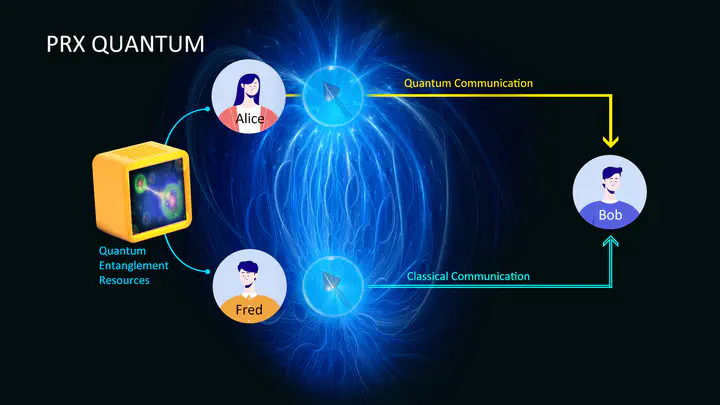Researchers make progress on quantum dense coding with locality constraints on decoder
 Quantum Dense Coding
Quantum Dense CodingThe research achievement has been reported in the official website of SUSTECH and SIQSE.
Dense coding is one of the earliest and most prominent quantum protocols that reveal the power of quantum entanglement in communication. Although it has been intensively studied, it has typically been restricted to scenarios where the receiver can perform global measurements to decode information, which is experimentally challenging. Thus, it is natural to impose locality conditions on the decoders from a practical perspective.
A research group led by Chief Research Scientist Masahito Hayashi of the Shenzhen Institute for Quantum Science and Engineering (SIQSE) at the Southern University of Science and Technology (SUSTech) has recently made progress on the study of quantum dense coding. In their study, they consider the dense coding scenario where certain asymmetry and locality constraints are imposed on the encoder and decoder.
Their paper, entitled “Dense Coding with Locality Restriction on Decoders: Quantum Encoders versus Superquantum Encoders,” was published in PRX Quantum, a well-recognized physics journal.
In this work, the researchers explored the practicality of dense coding by elaborating 21 classes of dense coding capacities with different encoder-decoder pairs, where the encoders are constrained by the resource theory of asymmetry and the decoders are constrained by various locality conditions.
Their contributions were to firstly show that all these capacities are equal and derive a single-letter capacity formula; secondly, prove that all these capacities satisfy the desirable strong converse property; and thirdly, establish an equivalence among three different quantities of a bipartite quantum state – the operationally defined dense coding capacity, the mathematically defined regularized asymmetry of assistance, and the quantum entropy of the twirled quantum state – thus providing the regularized asymmetry of the assistance measure an operational meaning.
The results of this work significantly push forward the research of practical dense coding in both the one-shot and asymptotic regimes within different resource theories. These results deepen our understanding of quantum entanglement and dense coding, and, more generally, classical and quantum communication via quantum resources.
Masahito Hayashi is the first author of this paper. He is also a fellow of the Institute of Electrical and Electronics Engineers (IEEE), Asia-Pacific Artificial Intelligence Association (AAIA), and Institute of Mathematical Statistics (IMS). The corresponding authors are Masahito Hayashi and Kun Wang, who is a former postdoctoral researcher in Hayashi’s group. The first affiliation of the paper is SIQSE.
The research was supported by the National Natural Science Foundation of China (NSFC), Guangdong Provincial Key Laboratory, Science, Technology and Innovation Commission of Shenzhen Municipality, and SUSTech.
Paper link: https://journals.aps.org/prxquantum/abstract/10.1103/PRXQuantum.3.030346